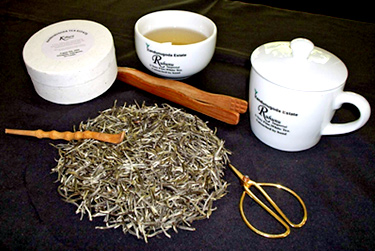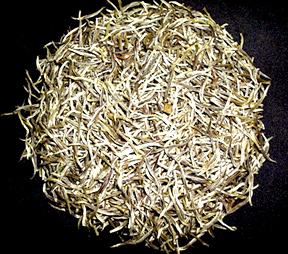White Tea - a ‘goldmine’ untapped
Fathima Razik
Ceylon then and Sri Lanka now, is synonymous with tea in whatever
form - as a produce, an industry, a beverage, and of course to go a step
further, the spacious and well planned bungalows that sit in the midst
of a ‘sea’ of landscaped tea plantations - home to planters and their
families for well over a century.
|

The white tea is an origin from a specific sub-species in
the tea bush |
Tea was first introduced to the country 147 years ago, and has
thrived since then. Today it is an industry that employs the most number
of people and considered the largest foreign exchange earner in Sri
Lanka, in real terms. In a population of 20 million people three to five
million are employed in the industry which translates into approximately
30 percent of the total workforce.
Interestingly, 60 percent of the island’s tea production comes from
the tea smallholders. Contributing to the economy in no small way, the
tea smallholders have had to face the same difficulties that the bigger
plantations have faced, time and time again in their endeavour to
produce and survive.
And 140 years ago, (seven years after the advent of tea in the
country), the great grandfather of Malinga Herman Gunaratne invested in
100 acres of land in Tittalgala, Ahangama, in the District of Galle,
named it Handunugoda Estate, and went on to plant tea - which venture to
date has stood the test of time, while the generations that followed
proved that hard work, foresightedness and innovation have paved the way
to success.
But then, what is white tea? It was first conceptualized in China
during the 5th-6th Century AD in the dynasties of Emperor Tsong and
Tsang. The Chinese mandarins are said to have employed virgins to
harvest the white tea, which is said to be the only tea in the world
untouched by hand. The virgins snip the white tea with golden scissors
that fall into a golden bowl so as to prevent any form of contamination,
prior to being given to the emperor. The only part of a human anatomy
that touched the tea was the lips of the emperor. The production was a
closely guarded secret, and the penalty for divulging it would result in
death as enshrined in the Imperial Chinese Constitution.
|

The white tea |
However, a British writer masquerading as a journalist discovered the
secrets of Chinese tea making, and went on to write a book titled Tea
Thief.
At Handunugoda, not being satisfied by producing a beverage like tea
that is perhaps the most sought after the world over, Malinga, a third
generation of the Gunaratne family - decided to formulate how to produce
white tea - a brew that has a been certified as having a high occurrence
of natural anti-oxidants in any beverage or edible product. With the
formulae being guarded he started planting the saplings exactly five
years ago - in August 2004. “The white tea is an origin from a specific
sub-species in the tea bush,” he explained.
Walking through the plantation while a cool breeze kept wafting
through and one’s eyes take in the vista, the difference in the teas was
evident as Gunaratne spoke of the process of how this magnificent plant
grew and thrived throughout the year. Neatly laid out rows and rows of
plants lay in the nursery - they remain there for six months to a year
before they are put on the field and then take around a year and half
for the white tips would emerge.
This would be the time to snip the white tips. Interestingly, even in
the nursery the white tips could be snipped if they are seen to appear
and this results in the tea bushing out. “We ensure that the tea
pluckers are properly attired and they are taught how to snip the leaf
with the golden scissor, and not pluck as they otherwise would,” said
Gunaratne adding that there are so many different permutations in the
production of tea.
He went on to relate an unanticipated occurrence when a Middle
Eastern Royal House placed an order for white tea produced by Gunaratne
with the condition that its ingredients had to be analysed. The analysis
was carried out by SGS - the world renowned Swiss company, through its
local agent in Sri Lanka. The analysis revealed that white tea had 10.11
percent anti-oxidants.
Its brew is anti-carcinogenic, and it boosts the immune system,
contains L. Theanine - an element that helps relaxation and stems the
ageing process. More importantly, it had no insecticide or pesticide
residue while the caffeine content was very low. Metallic content,
foreign matter, essence or additional colours, and pollution or
mushrooms or fungi were all recorded as absent in the analysis.
Since then his plantation has been producing the finest white tea
that is being marketed as an exclusive product and is considered far
superior in quality compared to other white tea produced in the world -
under the brand Virgin White Tea.
White tea produced in India or China is not as white as the tea
produced by Gunaratne. With year round production, Handunugoda estate
produces around 10kg of white tea every month which is marketed at a
hefty Rs 150,000 per kilo by one of the world’s most elite up market tea
distributors in Paris, France. Commenting on the degree of success
attained, this versatile planter attributes it to his motto at work -
‘People don’t work for a company; they work for people.’
Presently covering around five acres of the entire plantation,
Gunaratne hopes to expand production by extending the area of white tea
by two acres a year to meet the current demand.
For Handunugoda Tea Plantations, the demand from overseas outweighs
the production - which proves that this marvellous product from Sri
Lanka with a whole range of health benefits can reach far greater
heights and in the process positively contribute to the economy if only
its potential can be tapped, fully.
Fortunately, Malinga Gunaratne is on track, with the sweet smell of
success urging him and his staff at Handunugoda, reach for the stars. |



